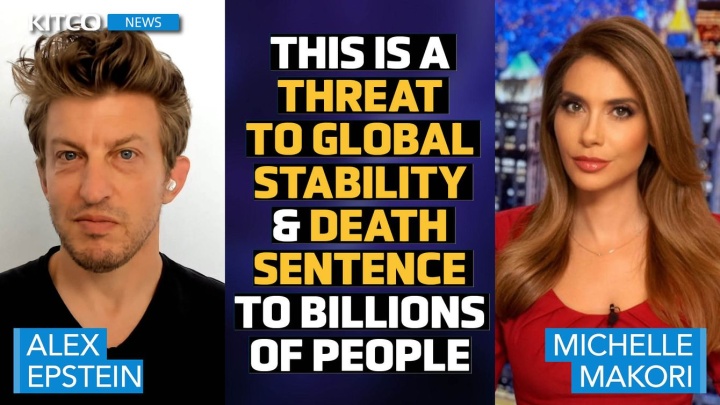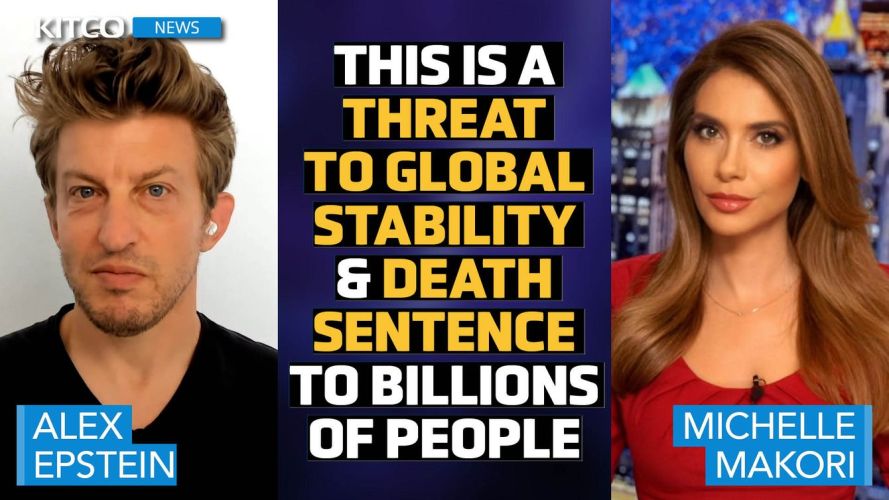


The goal of net zero by 2050 can lead to a "global homicide" as the world is looking at an energy crisis, according to Alex Epstein, philosopher, energy expert, and author of 'Fossil Future,' who says the framework in which fossil fuels are viewed needs to be reframed, adding that the benefits outweigh the side effects, especially in the context of human flourishing and technological progress.
The United Nations has been leading the charge for a world with net zero emissions by 2050. Net zero means balancing the amount of greenhouse gases we emit with the amount that we remove from the atmosphere.
This goal gained formal traction with a Paris Agreement adopted at the 2015 UN Climate Change Conference. Even though the 2050 deadline wasn't explicitly outlined in the agreement, it quickly became the global benchmark. More than 140 nations, including the world's largest polluters, China, the U.S., India, and the European Union, have pledged to reach net zero.
Understanding fossil fuels: What are fossil fuels?
Epstein tells Michelle Makori, lead anchor and editor-in-chief at Kitco News, that it is critical to understand fossil fuels in order to grasp both their side effects and benefits.
"Fossil fuels are high-energy hydrocarbons derived from ancient life," he explains. "The significance of that is when you burn a hydrocarbon, it releases a lot of energy as the bonds break apart. When you combine the hydrogen with the oxygen, you create water vapor. And then, of course, you combine the carbon and the oxygen, and you create CO2, which is the biggest concern people have in terms of our impact on climate."
Epstein explained that the world's goal should be achieving a more livable climate, and that is not what net zero is about.
"If you really wanted a more livable climate and thought about it for two seconds, you'd realize we've made it far more livable already. Are we safer from climate now than 100 years ago? ... Obviously we're safer now. The key to climate livability is not impacting the climate. The key is mastering the climate."
According to Epstein, climate livability, energy abundance and human flourishing should be the goal. He argues the world got "duped" into the net zero argument. Watch the video above for details.
"The idea that we should strive to have no impact on climate. The idea that we should strive to have no impact on anything is an anti-human idea. I reject this idea that we are some uniquely evil species whose impact we should hate," Epstein highlighted.
The real cost of net zero
Fossil fuels are essential for human flourishing as well as economic and technological progress, especially at a time when the world is facing an energy crisis, noted Epstein. His message comes at a time when North American Electric Reliability Corporation (NERC) is warning that much of North America may face electricity shortages starting in 2024, with more than 300 million people at risk of electricity shortages this year.
Epstein pointed out that the world is not in the middle of a successful transition to renewable energy, as many believe.
"We're in an energy addition at most. People deny this. They pretend solar and wind are rapidly replacing fossil fuels. It's just it's just not happening. We're using more fossil fuels than ever every year, despite the fact that getting rid of fossil fuels via net zero is literally the number one political goal in the world."
Watch the video above for Epstein's take on why fossil fuels are uniquely cost-effective and scalable.
There has been no technological developments significant enough to replace the the attributes that have made fossil fuels vital in the past, Epstein noted.
"Nothing fundamentally has changed to make fossil fuels less necessary. Particularly because most of the world still has very little energy," he added. "We're already seeing a global energy crisis and blackouts in the United States, the degradation of our grid, and we haven't even moved in the direction of net zero. All we've done is slow the growth of fossil fuels globally, and we've created all these problems. We haven't even reduced fossil fuels globally yet. They want to get rid of them in 26 years. So it's just an act of global homicide."
For consequences, if this net zero goal continues to be pushed forward, watch the video above.
There is a path to finding a form of energy better than fossil fuels, but humanity won't get there via bans.
"You don't get that by banning fossil fuels and making everyone poor and die early. You get that by having a world of innovation and capitalism where fossil fuels ultimately pave the way for something superior. It's a gradual process, but it's a process we should welcome. But you don't welcome it by destroying the fossil fuels that make it possible," Epstein noted.
Bitcoin as energy money
Epstein pointed out that the concept of fossil fuels as the combination of natural storage, natural concentration, and natural abundance, harnessed ultra-cost effectively by generations of economic innovation and achievement, can be applied to gold and Bitcoin.
"What we've seen with the government's monopoly on money – the purchasing power gets totally diluted. Money is used to manipulate the economy in all sorts of ways, favoring different sectors over other sectors and favoring certain people over other people. You create enormous amounts of corruption. You create the long-term problems with deficit spending," he said.
As with energy, the world should be free to choose the best form of money, Epstein added.
"I believe in human freedom in all areas of life. And just as energy is a fundamental area of life, money is a fundamental area of life," he explained. "I've always objected to the idea that the government dictates money. People should be free to discover what the best form of money is for them. Bitcoin is a fascinating innovation."
For Epstein's description of Bitcoin as energy money, watch the video above. He also addresses the wrong type of thinking when examining Bitcoin's energy use.
Kitco Media
Anna Golubova
